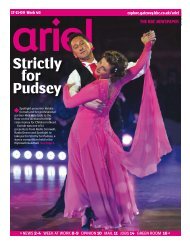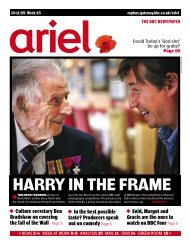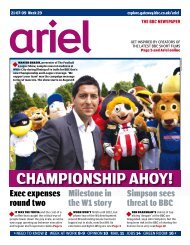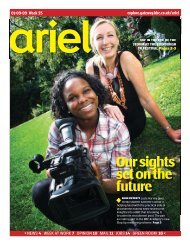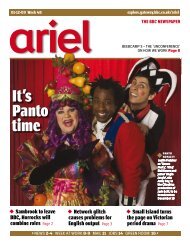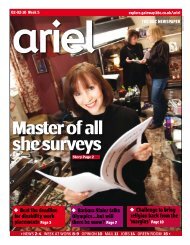to see an electronic copy of this week's Ariel. - Noticeboard for ...
to see an electronic copy of this week's Ariel. - Noticeboard for ...
to see an electronic copy of this week's Ariel. - Noticeboard for ...
Create successful ePaper yourself
Turn your PDF publications into a flip-book with our unique Google optimized e-Paper software.
16 2 News<br />
a 00·00·08 23·06·09<br />
a<br />
Room 2425, White City<br />
201 Wood L<strong>an</strong>e, London W12 7TS<br />
020 8008 4228<br />
Edi<strong>to</strong>r<br />
Andrew Harvey 02-84222<br />
Deputy edi<strong>to</strong>rs<br />
Sally Hillier 02-26877<br />
Cathy Loughr<strong>an</strong> 02-27360<br />
Features edi<strong>to</strong>r<br />
Clare Bolt 02-27445<br />
Reporters<br />
Carla Parks 02-27630<br />
Laura Scarrott 02-84224<br />
Peggy Walker 01-43940<br />
Production edi<strong>to</strong>r<br />
Claire Barrett 02-27368<br />
Art edi<strong>to</strong>r<br />
Ken Sinyard 02-84229<br />
<strong>Ariel</strong> online<br />
Andy Walker (edi<strong>to</strong>r) 02-84227<br />
Alex Goodey 02-27410<br />
Business co-ordina<strong>to</strong>r<br />
Silv<strong>an</strong>a Rom<strong>an</strong>a 02-84228<br />
<strong>Ariel</strong> mail<br />
claire.barrett@bbc.co.uk<br />
<strong>Ariel</strong> online expore.gateway.bbc.uk/ariel<br />
Guest contribu<strong>to</strong>rs <strong>this</strong> week<br />
FERGUS WALSH the BBC’s medical<br />
correspondent on reporting swine<br />
flu <strong>an</strong>d what will happen <strong>this</strong> autumn<br />
Page 8<br />
ANNA CASSAR <strong>of</strong> Radio 4 explains the<br />
enduring appeal <strong>of</strong> messageboards<br />
Page 6<br />
BBC Jobs 0370 333 1330<br />
Jobs textphone 028 9032 8478<br />
BBC Jobs John Clarke 02-27143<br />
Room 2120, White City, London W12 7TS<br />
Advertise in <strong>Ariel</strong><br />
Ten Alps Publishing 020 7878 2314<br />
www.bbcarielads.com<br />
Printing<br />
Garnett Dickinson Group<br />
Rotherham 01709 768000<br />
Subscribe <strong>to</strong> <strong>Ariel</strong><br />
Six months: £26, £36, £40<br />
Twelve months: £50, £60, £68<br />
(prices <strong>for</strong> UK, Europe, rest <strong>of</strong> world<br />
respectively)<br />
Cheques <strong>to</strong>: Garnett Dickinson Print,<br />
Brookfields Way, M<strong>an</strong>vers,<br />
Wath Upon Dearne, Rotherham S63 5DL<br />
Tel 01709 768199<br />
INFORMATION IN AN EMERGENCY<br />
Telephone 0800 0688 159<br />
Ceefax Page 159 www.bbc.co.uk/159<br />
<strong>Ariel</strong> is produced by Internal<br />
Communcations <strong>for</strong> people at the BBC<br />
PLEASE RECYCLE YOUR COPY OF ARiEL<br />
> ARIEL ONLINE: BBC NEWS AS IT HAPPENS – EXPLORE.GATEWAY.BBC.CO.UK/ARIEL<<br />
NEED TO KNOW: the carter report<br />
September showdown<br />
looms over <strong>to</strong>p slicing<br />
u DiGiTAL BRiTAiN is the<br />
government’s attempt <strong>to</strong> map the<br />
UK’s communications needs <strong>for</strong><br />
the next five years. From a BBC<br />
perspective the key issue involves<br />
a proposal <strong>to</strong> take around £130m<br />
from licence fee revenue each<br />
year <strong>an</strong>d give it <strong>to</strong> independent<br />
regional news providers.<br />
The report also recommends<br />
<strong>an</strong> exp<strong>an</strong>ded role <strong>for</strong><br />
BBC Worldwide as a global<br />
business but with ‘greater separation’<br />
from the BBC.<br />
u WHERE’S THE MONEY COMiNG FROM?<br />
Until 2013 the government w<strong>an</strong>ts <strong>to</strong> use <strong>an</strong>y underspend<br />
(estimated <strong>to</strong> <strong>to</strong>tal £200m) from the digital<br />
help scheme <strong>for</strong> two purposes: <strong>to</strong> help achieve a<br />
universal broadb<strong>an</strong>d network <strong>an</strong>d <strong>to</strong> fund three<br />
pilot news operations in Scotl<strong>an</strong>d, Wales <strong>an</strong>d <strong>an</strong><br />
English region by independently fin<strong>an</strong>ced news<br />
consortia (IFNCs, <strong>see</strong> below) . The pilots would<br />
establish how much funding might be required by<br />
new entr<strong>an</strong>ts in<strong>to</strong> news provision. It is <strong>an</strong>ticipated<br />
that they could work more cheaply th<strong>an</strong> the traditional<br />
news gathering operation <strong>of</strong> ITV.<br />
u WHAT ABOUT LONG TERM? After 2013,<br />
when licence fee levels will be renegotiated, £130m<br />
a year would continue <strong>to</strong> be drawn from the licence<br />
fee in what Carter calls ‘a contained contestable<br />
element’ (colloquially <strong>to</strong>p slicing) <strong>an</strong>d given <strong>to</strong><br />
IFNCs. Carter says the BBC remains the gold st<strong>an</strong>dard<br />
<strong>for</strong> broadcasting <strong>an</strong>d should not be weakened.<br />
The money he w<strong>an</strong>ts <strong>to</strong> go <strong>to</strong> regional news would<br />
be in addition <strong>to</strong> the BBC’s licence fee settlement.<br />
The Conservatives are opposed <strong>to</strong> <strong>to</strong>p slicing but<br />
threaten <strong>to</strong> reduce the licence fee.<br />
u WHO PROViDES ALTERNATiVE NEWS?<br />
The government will invite local groups <strong>to</strong> <strong>for</strong>m<br />
IFNCs as news providers across the UK. These could<br />
include existing commercial tv comp<strong>an</strong>ies, local<br />
newspapers, news agencies, other publishers. They<br />
would bid <strong>for</strong> a fr<strong>an</strong>chise in much the same way that<br />
the old regional television comp<strong>an</strong>ies divided the<br />
terri<strong>to</strong>ry – only <strong>this</strong> time successful bidders would<br />
receive licence fee funding. A licensing body would<br />
be responsible <strong>for</strong> allocating money <strong>an</strong>d ensuring<br />
high edi<strong>to</strong>rial st<strong>an</strong>dards. (This is a role envisaged <strong>for</strong><br />
the BBC Trust by Peter Bazalgette, <strong>see</strong> Page 10).<br />
u HAS LiCENCE FEE MONEY PREViOUSLY<br />
GONE ELSEWHERE? Yes. The present licence<br />
fee includes a sum <strong>of</strong> around £150m a year <strong>to</strong> help<br />
pay <strong>for</strong> digital switchover, principally providing the<br />
elderly with set <strong>to</strong>p boxes. The BBC agreed <strong>to</strong> <strong>this</strong><br />
because the spending was allied <strong>to</strong> its mission <strong>to</strong><br />
help drive digital uptake. Michael Lyons predicts<br />
that once government starts using licence fee<br />
money <strong>for</strong> other things it won’t s<strong>to</strong>p at tv news.<br />
Digital Britain is largely<br />
the work <strong>of</strong> Stephen Carter,<br />
minister <strong>for</strong> communications,<br />
technology <strong>an</strong>d broadcasting,<br />
who says it should be <strong>see</strong>n as<br />
‘resoundingly good news’ <strong>for</strong><br />
the BBC which the government<br />
is encouraging <strong>to</strong> be a ‘bigger<br />
<strong>an</strong>d broader’ media player.<br />
That, <strong>of</strong> course, sets <strong>to</strong> one<br />
side the licence fee question<br />
<strong>an</strong>d here Michael Lyons<br />
positioned himself on a collision<br />
course. The chairm<strong>an</strong><br />
<strong>of</strong> the BBC Trust in <strong>an</strong> email <strong>to</strong><br />
everyone made it clear that<br />
the licence fee should not be<br />
regarded as a ‘slush fund’ <strong>an</strong>d<br />
that his trustees would ‘not sit<br />
quietly by’ while the government<br />
raided the kitty.<br />
Since then the temperature<br />
has cooled a little <strong>an</strong>d the BBC<br />
has until early September <strong>to</strong><br />
accept <strong>to</strong>p slicing, suggest a<br />
workable alternative or try <strong>to</strong><br />
<strong>for</strong>ce the government <strong>to</strong> back<br />
down. Debate: Page 10<br />
u WHAT HAPPENS TO THE BBC’S PART-<br />
NERSHiP OFFER TO iTV? In the event that <strong>to</strong>p<br />
slicing happens, Mark Thompson has said the BBC<br />
would probably take its <strong>of</strong>fer <strong>to</strong> share content <strong>an</strong>d<br />
facilities with ITV ‘<strong>of</strong>f the table’. However, if non-<br />
licence fee funding is found <strong>to</strong> help either ITV or<br />
new IFNCs, the BBC would extend a helping h<strong>an</strong>d.<br />
u TiMESCALE The government w<strong>an</strong>ted <strong>to</strong><br />
<strong>an</strong>nounce <strong>to</strong>p slicing as a done deal until Michael<br />
Lyons objected so <strong>for</strong>cefully. Instead, the proposal<br />
<strong>to</strong> take a 3.5 percent portion <strong>of</strong> licence fee<br />
– the ‘contained contestable element’ – has been<br />
opened <strong>for</strong> consultation until early September.<br />
Carter is convinced regional news needs support<br />
from somewhere (although Sky is unconvinced)<br />
<strong>an</strong>d has ruled out direct treasury gr<strong>an</strong>ts. The government<br />
says it is open <strong>to</strong> other suggestions but if<br />
nothing viable emerges by September the BBC will<br />
either have <strong>to</strong> accept or fight the pl<strong>an</strong>.<br />
u WHAT’S THE PLAN FOR RADiO?<br />
The government w<strong>an</strong>ts <strong>to</strong> move all national <strong>an</strong>d<br />
large stations away from FM <strong>an</strong>d AM <strong>to</strong> DAB, switching<br />
<strong>of</strong>f <strong>an</strong>alogue in 2015. The reasoning is that the<br />
nature <strong>of</strong> audio ‘puts it at the <strong>for</strong>efront <strong>of</strong> device<br />
<strong>an</strong>d plat<strong>for</strong>m convergence’ with availability through<br />
the internet, mobiles, digital tv where it will need its<br />
own digital medium. With 9m DAB sets already in<br />
use in the UK, switchover is the chosen route.<br />
The government is asking the BBC <strong>to</strong> extend national<br />
DAB coverage so that it is at least comparable<br />
<strong>to</strong> FM radio; it w<strong>an</strong>ts m<strong>an</strong>ufacturers <strong>to</strong> come up with<br />
receivers that cost no more th<strong>an</strong> £20 <strong>an</strong>d it w<strong>an</strong>ts<br />
car makers <strong>to</strong> move <strong>to</strong> DAB no later th<strong>an</strong> 2013.<br />
Although there has been criticism <strong>of</strong> the quality <strong>of</strong><br />
the signal <strong>an</strong>d environmentalists have complained<br />
that DAB uses four times the power <strong>of</strong> traditional<br />
radios, the BBC is supportive.<br />
u WHAT ELSE DOES CARTER SAY ABOUT<br />
THE BBC?<br />
BBC Trust should encourage the BBC <strong>to</strong> exceed its<br />
2012 targets <strong>for</strong> network production in Scotl<strong>an</strong>d,<br />
Wales <strong>an</strong>d Northern Irel<strong>an</strong>d. (The current pl<strong>an</strong> is <strong>for</strong><br />
12 percent <strong>of</strong> network spending <strong>to</strong> go <strong>to</strong> the three<br />
nations by 2012 <strong>an</strong>d 17 percent by 2016.)<br />
What’s in it <strong>for</strong> Worldwide?<br />
u iN A WORD, ExPANSiON.<br />
Carter says it would be a missed<br />
opportunity <strong>to</strong> ‘limit Worldwide <strong>to</strong><br />
a narrow supporting role’ <strong>to</strong> the<br />
BBC. He says the future route <strong>for</strong><br />
the comp<strong>an</strong>y is ‘not <strong>to</strong> restrain it<br />
but <strong>to</strong> give it more freedom <strong>an</strong>d<br />
more breadth’.<br />
This will probably be music<br />
<strong>to</strong> the ears <strong>of</strong> John Smith, WW’s<br />
chief executive who has led a<br />
growth policy <strong>an</strong>d who<br />
pulled <strong>of</strong>f the acquisition <strong>of</strong><br />
the Lonely Pl<strong>an</strong>et business.<br />
Carter <strong>see</strong>ms <strong>to</strong> say ‘go<br />
<strong>for</strong>th <strong>an</strong>d multiply’ although at<br />
the same time he’s calling <strong>for</strong><br />
greater separation between<br />
Worldwide <strong>an</strong>d its parent, even<br />
<strong>to</strong> the point <strong>of</strong> suggesting the<br />
possible sale <strong>of</strong> part <strong>of</strong> the<br />
business.<br />
How exp<strong>an</strong>sion could be<br />
achieved while protecting<br />
<strong>an</strong>d promoting the BBC br<strong>an</strong>d<br />
<strong>an</strong>d at the same time avoiding<br />
undue market impact, he<br />
doesn’t say. ‘Please go away<br />
<strong>an</strong>d have a look,’ he says.<br />
<strong>Ariel</strong> View: Page 10<br />
COMMENTARY<br />
The bigger<br />
threat <strong>to</strong><br />
the BBC<br />
BILL<br />
THOMPSON<br />
u THE DEBATE<br />
about how we<br />
build Digital Britain<br />
reflects the import<strong>an</strong>ce<br />
<strong>of</strong> connected computers in<br />
our lives, but I like <strong>to</strong> think that I’ve<br />
been living in my own digital Britain<br />
<strong>for</strong> a while. I’ve been online <strong>for</strong><br />
25 years, <strong>an</strong>d remember the BBC’s<br />
first internet connection as well as<br />
the first world wide web conference.<br />
Today I am rarely <strong>of</strong>fline <strong>an</strong>d<br />
on <strong>an</strong> average evening there are<br />
seven or eight computers, phones<br />
<strong>an</strong>d games consoles sharing my<br />
20megabit home internet connection.<br />
I am a wired citizen <strong>of</strong> the network<br />
age, or something like that.<br />
Like m<strong>an</strong>y early adopters I am<br />
having <strong>to</strong> work hard <strong>to</strong> keep up as<br />
new <strong>to</strong>ols, services <strong>an</strong>d technologies<br />
emerge <strong>an</strong>d <strong>to</strong>ys that were once cutting<br />
edge become commonplace,<br />
from email <strong>to</strong> social media.<br />
This is also a problem <strong>for</strong> org<strong>an</strong>isational<br />
early adopters like the BBC,<br />
since being a big web publishing success<br />
s<strong>to</strong>ry is no guar<strong>an</strong>tee <strong>of</strong> survival<br />
in the age <strong>of</strong> social networks, while<br />
success in streaming conventional<br />
television doesn’t ensure relev<strong>an</strong>ce<br />
in <strong>an</strong> always-on, two-way world filled<br />
with connected devices.<br />
This may become a serious issue<br />
<strong>for</strong> the BBC if Carter’s proposals are<br />
implemented, because they include<br />
pl<strong>an</strong>s <strong>to</strong> provide next generation<br />
broadb<strong>an</strong>d <strong>to</strong> the whole <strong>of</strong> the UK,<br />
<strong>an</strong>d once the whole country has 50<br />
or 100mbps available the iPlayer is<br />
going <strong>to</strong> look very old-fashioned.<br />
The pl<strong>an</strong> <strong>for</strong> comprehensive next<br />
generation access was a welcome<br />
improvement on the widely criticised<br />
suggestion that 2mpbs universal<br />
broadb<strong>an</strong>d might suffice.<br />
The fast network will be partly<br />
funded by £6 a year levy on ordinary<br />
phone lines. Since it will raise<br />
only a small portion <strong>of</strong> the billions<br />
such a network will cost, perhaps it<br />
should be <strong>see</strong>n not as a policy but as<br />
a nudge, as used by Cass Sunstein<br />
<strong>an</strong>d Richard Thaler in their book on<br />
‘improving decisions about wealth<br />
<strong>an</strong>d happiness’. It tells ISPs that fast<br />
broadb<strong>an</strong>d allows comp<strong>an</strong>ies <strong>to</strong> work<br />
on the basis that marginal areas<br />
will be subsidised <strong>an</strong>d so should be<br />
included in their pl<strong>an</strong>s, <strong>an</strong>d <strong>of</strong>fers<br />
those providing content <strong>an</strong>d services<br />
due notice that high speed connectivity<br />
will be made available.<br />
Today’s levels <strong>of</strong> internet access in<br />
the UK have already <strong>for</strong>ced a rethink<br />
<strong>of</strong> the need <strong>for</strong> a public service<br />
broadcaster <strong>an</strong>d a re-evaluation <strong>of</strong><br />
the BBC’s role. Forget <strong>to</strong>p slicing the<br />
licence fee: building a high speed<br />
network is a greater threat <strong>to</strong> the<br />
BBC’s continued existence.<br />
Bill Thompson is <strong>an</strong> internet commenta<strong>to</strong>r



